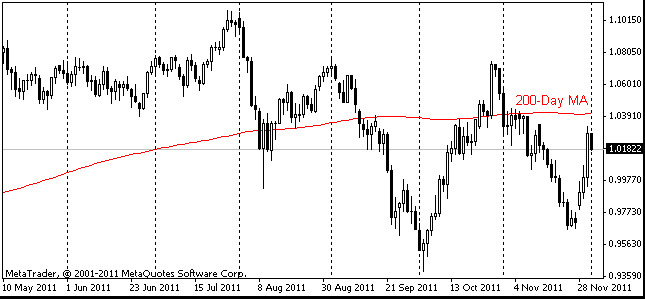EUR/usd
Germany and France took the initiative to make certain alterations to the EU Treaty and introduce automatic penalties for violation of budgetary discipline. The positive effect of this will consist in the earlier supply of the states in need of bailout with money. In his speech Sarkozy tried to convince the public that France and Germany would pay out their debts in full. We heard the same from Greece less than two years ago, but now even the Bank of England estimates the probability of debt restructuring in Greece at 100%. S&P, the most daring rating agency, announced that if there wasn't any comprehensive plan worked out on the basis of Friday's summit, the EU countries (15, Including Germany!) could face unprecedented and massive rating cuts. The market cautions led the euro to fall from intraday high of 1.3485 to 1.3370, at the very level of Friday's lows. A positive gap which had formed on Italian economy measures disappeared rapidly. At the same time playing against the euro can be treated with understanding since the EU summit is still to come with the ECB meeting preceding it. The latter, in fact, is expected to result in the rate reduction of 25 basis points and also in the outline of measures aimed at greater involvement in overcoming the debt crisis. Despite this fact demand for risk keeps growing which in the end can turn out to be favourable for the euro. The euro can also benefit from a large number of short positions opened now in Forex; their massive closing can trigger off a huge upward wave.

GBP/USD
The data on the service sector in Britain which were published on Monday indicated an increased activity in November. Services PMI rose from 51.3 to 52.1, which stands in contrast with the serious decline in Continental Europe. Apparently, realizing this divergence and willing to emphasize how Britain differs from the rest of EU, the Bank of England has an impudence to point out the roots of the crisis in the euro area as well as to unveil the preparation of the so-called “plan B” in case the situation in the region goes to the worse. It is not very polite, especially taking into account that the process is not yet completed and the policymakers are striving to solve the problem. However, the sterling continues to get its bids, having modestly increased from 1.56 to 1.5645 on Monday. But already next morning without the help of RBC's reports about a 1.6% decrease of retail sales in the country (y/y) trading was carried out again around 1.5620. Today there won't be any vital statistics on the UK except for publishing of Halifax Home Price Index for November. More interesting data on the UK are still to come. On Wednesday statistics on industrial production will be published, and on Thursday we will finally learn the decision of the Bank of England. So increase in the British currency volatility can be expected a bit later.

USD/JPY
Asian stocks lost 0.7-1.2%% on the S&P warning and cautious attitude to Sarkozy and Merkel's decisions on Tuesday. usdjpy has stopped growing. The pair fell from the levels close to 78 to the 77.75 area. Further growth requires corresponding increase in demand for risk and strengthening of stock markets. Now the yen trading has gone into the “standby mode”. It is rumoured that this year major forex traders are going to make earlier and greater cuts in their trading volumes than in the previous years. This may increase the volatility for retail traders and, perhaps, encourage USDJPY to enter a new phase of the long-term growth.

AUD/USD
RBA lowered its key interest rate by a quarter of the percentage point to 4.25%, as has been expected by the overwhelming majority of analysts. However, after the publication of the decision aussie immediately sank as the accompanying statement contained comments about a high probability of future reductions. The situation in the country is described as not bad (the demand is stronger than the trend, the economic growth is within the trend), but the CB governor has made some reference to a certain slowdown in Asia resulting from the problematic situation in Europe. The Bank has characterized the lending terms as average for the period of the last 15 years. However, lending to business is going to become much worse in the near future. The inflation slowdown, as they say in the Bank, will enable the implementation of the monetary easing policy. It is easier than we expected. Aussie has fallen from 1.03, which was reached yesterday, to 1.018. Have the bears regained their control over the currency and is the parity again in the fire line?
